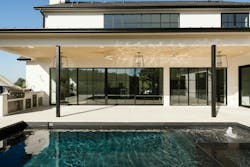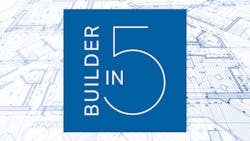Real Talk with a Texas Builder on Growing a Luxury Firm From the Ground Up
Builder in 5 is our ongoing interview series spotlighting the professionals behind exceptional custom homes—those who bring skill, creativity, and grit to the craft. In just five focused questions, we dig into how they think, how they work, and what they’ve learned about process, pressure, and the art of building.
Up Next: Danny Spears. Spears is the founder of Austin, Texas-based custom home building business Captex Construction.
Spears' journey in construction started long before he founded Captex Construction in 2010. Starting at age 15, he worked on jobsites with family friends, sparking a long career in residential and commercial construction. From the start, Spears says he was intrigued by the process of watching a project go from an empty lot to a finished product. That ultimately led him to start his own business, which serves the custom luxury market across the Austin, Texas metro.
1. You've worked both commercial and residential construction projects. How has that experience impacted your work today?
Danny Spears: My previous experience has had a significant impact on the way I approach projects. In commercial work, I learned the importance of precision, scheduling, and managing large teams across complex timelines—skills that are crucial when handling the high expectations and fine details of luxury homebuilding. Residential projects taught me how personal a home is to a client, and how important it is to maintain clear communication and trust throughout the process.
I’ve been able to bring those lessons together to elevate the client experience. I understand how to balance the technical side of construction with the emotional investment our clients bring to a custom home. My background allows me to anticipate challenges early, streamline workflows, and uphold high standards of quality and service. Ultimately, it’s helped me ensure that each home we build is not just beautifully constructed, but also delivered with professionalism and care.
Growth for us isn’t about volume—it’s about continually improving the quality of what we deliver and deepening our impact in the communities we serve.
2. How has your company grown since its founding? What goals do you have for the business moving forward?
Spears: Since our founding in 2010, we’ve grown from a small, locally focused builder into a recognized name in the Austin luxury home market. Early on, we were focused on establishing our reputation—delivering high-quality custom homes and earning client trust one project at a time.
Over the years, that commitment helped us expand our portfolio, build lasting relationships with top architects and designers, and take on increasingly complex and high-end projects. Today, we’re known not just for the homes we build, but for the service and collaboration we provide throughout the entire journey.
Looking ahead, our goals are focused on thoughtful growth. We want to continue raising the bar in craftsmanship and design, expand into select markets around Central Texas, and explore ways to integrate more sustainable and smart home features into our builds. Most importantly, we want to maintain the personal touch and attention to detail that got us where we are. Growth for us isn’t about volume—it’s about continually improving the quality of what we deliver and deepening our impact in the communities we serve.
3. What does your typical process look like for luxury home projects?
Spears: Our process is highly personalized, transparent, and detail-oriented. We know our clients are making a significant investment—not just financially, but emotionally—so we aim to make the journey as seamless and rewarding as possible.
We start by getting to know the client, their lifestyle, and their vision for the home. This includes understanding their design preferences, functionality needs, and budget. If an architect or designer isn’t already involved, we help connect the client with the right team.
Once the vision is clear, we collaborate closely with the architect and interior designer to refine plans, select materials, and develop a detailed construction estimate and timeline. This is also when we value-engineer solutions to align the client’s vision with their budget, without compromising quality.
When plans are finalized and permits are secured, we begin construction. We maintain an open line of communication with clients through regular updates, site visits, and project management tools that track progress, selections, and changes in real-time. Quality control is central—we’re meticulous about craftsmanship, and our team ensures every detail aligns with the original vision.
As we near completion, we conduct a thorough walkthrough to address any final touch-ups. Once the home is move-in ready, we walk the client through all the systems and features, ensuring they feel confident and excited about their new space. But our relationship doesn’t end at handover. We remain available for ongoing support, warranty needs, and future updates. Many of our clients return for additional projects or refer friends and family, which is the highest compliment we can receive.
Many great builders struggle not because of craftsmanship, but because of poor business structure.
4. What are the biggest challenges facing the home building industry today? And how can businesses work to overcome them?
Spears: In my opinion, the home building industry is facing several major challenges today, especially in the luxury custom space.
First, material costs continue to fluctuate. While the worst of the pandemic-related delays have eased, certain specialty items—particularly high-end finishes and custom materials—can still be unpredictable in terms of lead times and availability. That puts pressure on budgets and schedules, and requires a lot of proactive planning and communication.
Second, local regulations and permitting processes are becoming more complex and time-consuming, especially in high-demand markets like Austin. It can significantly impact project timelines and client expectations. Navigating those hurdles requires experience and persistence.
Third, interest rates, inflation, and general economic uncertainty can impact client confidence and decisions. Luxury clients are typically more insulated, but they’re also more selective—so it's critical to provide exceptional value and transparency throughout the process.
Ultimately, these challenges are also opportunities—ways to differentiate through better planning, clearer communication, and more thoughtful construction. We see them as a chance to raise the standard for what it means to build a luxury home today.
Success in this field is about showing up consistently, solving problems with integrity, and learning from every project.
5. What tips do you have for other builders looking to start their own business?
Spears: Starting your own building business is incredibly rewarding, but it also comes with real challenges. If I had to offer a few key tips to builders looking to make that leap, here’s what I’d say:
Start with a solid foundation—literally and figuratively. Make sure you have a deep understanding of construction, but also of business fundamentals—budgeting, contracts, risk management, and client communication. Many great builders struggle not because of craftsmanship, but because of poor business structure.
Build a reputation before you build a brand. Early on, your name is everything. Focus on quality, reliability, and transparency—even if it means slower growth. Word-of-mouth and referrals are gold in this business, and trust is your greatest marketing tool.
Surround yourself with the right people. Your subs, vendors, and internal team will make or break your projects. Invest time in finding the right partners and treat them well. A strong, loyal team is one of the biggest competitive advantages you can have.
Don't underestimate the power of communication. Whether it’s with clients, architects, inspectors, or trades, clear and proactive communication keeps projects on track and relationships strong. Many problems can be avoided just by keeping everyone informed and aligned.
Stay patient and resilient: There will be tough clients, delayed permits, weather issues, and budget surprises. Success in this field is about showing up consistently, solving problems with integrity, and learning from every project.
Starting a construction business takes grit, but if you do it with a long-term mindset and a commitment to quality, it can be incredibly fulfilling.
More Builder in 5 Interviews: For more insights from the field, read our earlier Builder in 5 interview with Adam Breen, a Park City builder talking tough home sites and the moment he enjoys a home's "first breath."
You Might Also Like...
- Pioneer Builders' Tim Uhler shares how he grew his company's social media presence
- An accessory dwelling unit built on a wooded lot in Austin, Texas
- Business coach Scott Beebe offers insights on growing a successful business
About the Author
Catherine Sweeney
Catherine Sweeney is the associate editor for Pro Builder and Custom Builder, where she creates both digital and print content, including Pro Builder’s daily e-newsletter and various news stories for both brands. Before joining Endeavor, she began her career in local journalism, later pivoting to the commercial real estate industry where she worked for several years as a reporter and editor.




